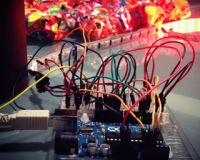Posted on Thu 26 May 2016
Open Source Magic
Open source magic is turning out to be a little more challenging than I first thought.In preparing for our magic ‘hack’, I've made a number of personal and broadcast invitations to magicians. How people have responded has told me a lot about how challenging it is to bring a maker culture and…

Posted by
Project

Magician in Residence: Kieron Kirkland
During his residency, Keiron researched the synergies and opportunities between magic and the maker movement.Open source magic is turning out to be a little more challenging than I first thought.
In preparing for our magic ‘hack’, I've made a number of personal and broadcast invitations to magicians. How people have responded has told me a lot about how challenging it is to bring a maker culture and open source approaches to a new community.
I've had varied responses, from boundless optimism to deep suspicion. What’s shocked me though is how alien the concept is, not just of the idea of a hack, but actually the idea of developing new ideas in this collaborative way. Because of this I’ve begun to realise how we risk taking the culture of the maker movement and tradition of open source for granted. And quite how much magic stands to gain from it.
I'm firmly of the belief that open source approaches result in greater innovation and benefits for the wider community. So really what I'm interested in doing is finding open source approaches for magic. The reason for this is not just down to a romantic view of Open Source movement, or a deep desire to be a Share Bear. The principles and approaches offer a way for magic to get over some very serious (and surprisingly familiar) problems it faces.
Magicians have always been quite good at sharing within their own community. But with some notable exceptions, they are pretty terrible at collaborating. In the past maybe it made sense, and arose on a fear about ‘exposure’ (sharing secrets). The problem is that this closed by default approach just doesn’t work anymore and risks doing more harm than good.
Firstly, magic secrets aren’t that secret anymore. Magic is facing the same issues with copyright and file sharing that any other industry is. If people want to find out how 95% of magic tricks are done, there are a thousand 8 year olds on YouTube who will share how any trick works. Often annoying well. To be honest there’s always been exposure of secrets, but the nature of modern technology means that it’s happening on a whole new scale. So we can either cling onto a shrinking pile of old secrets, or get inspiration from collaborations to develop new and progressive approaches to using existing ideas in magic, and to develop new ones.
The irony is that the last thing magicians need to be worried about is people knowing the mechanics of tricks. As Jim Steinmeyer says, magicians guard an empty safe. The principles of magic are so much more powerful than that. And it angers me that people think that the secret of magic is contained in a special sleight. Anyone can learn a trick; it’s the creative application and weaving together of these sleights, principles and presentations that make a good magic performer.
Secondly being a closed group means magic is slow to take advantage of the new opportunities out there. At best, it has to wait for members of the community to bring that knowledge in, at worst means it’s introspective and sticks with what it knows. This is an issue with any aspect of a magic performance, but is a particularly a missed opportunity when it comes to technology. Traditionally magic and technology have intertwined. But today technology is changing so fast that the magic community is not taking advantage of it.
Thirdly we need new performing spaces for magic. If you’re a working magician you mostly perform at private parties or corporate work. And occasionally do some consulting for theatres. The inventive performers out there have found all sorts of amazing ways to break into new industries that would normally balk at buying a magic act. But who are interested in how magic can support their work in different ways. Without collaboration and openness you’ll never be able to find out these new angles and break into new markets yourself.
To be clear, this ‘open source’ magic is not about exposing tricks to all and sundry. It’s about opening up and enabling collaboration not just within the community but beyond. The open source approach has achieved massive development in other communities, most notably the tech sector, where ‘secrets’ are just as commercially and professionally valuable. Open source magic also doesn’t mean everything is open, and there are many ways to find mixed business and collaboration models.
However getting magicians to open up and move beyond old habits is difficult, and the reactions to the hack are probably a good representation of this. Some people get the vision immediately, and see how it can benefit both themselves and magic as a whole. Others are suspicious. Ironically I think this arises from magicians undervaluing their way of thinking, and overvaluing methods.
I started off just wanting to introduce new technologies to the magic community. But what I’ve realised is that they go hand in hand with culture. You can’t have a maker movement without openness, sharing, and collaboration. I’ll be honest, some of the reactions I got from the hack invites have made me want to shut up shop, ditch the idea of a maker wiki for magic and just sell the products we invent on this residency. But then, the closed up culture would already have won and the art I love risks continuing to miss out.
